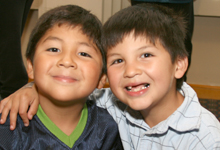Aboriginal People in Nova Scotia

The Mi'kmaq are the founding people of Nova Scotia and remain the predominant Aboriginal group within the province. When the Mi'kmaq first encountered Europeans in the 16th and 17th centuries, their territory stretched from the southern portions of the Gaspé Peninsula eastward to most of modern-day New Brunswick, and all of Nova Scotia and Prince Edward Island.
This area was divided into seven smaller territories across what was known as Mi'kma'ki. Today, the Mi'kmaq live throughout the province. Nova Scotia has 13 Mi'kmaq First Nations with community populations ranging from 283 in the Annapolis Valley First Nation to 4,314 in the Eskasoni First Nation. In total, there are 16,245 registered Indians in Nova Scotia and of these, 5,877 live off-reserve (Source: Aboriginal Affairs and Northern Development Canada (AANDC) Indian Registry System as of December 31, 2014). The Registered Indian population in Nova Scotia is represented through a series of 13 band councils and two tribal councils, the Confederacy of Mainland Mi'kmaq and the Union of Nova Scotia Indians. The Union of Nova Scotia Indians tribal council represents the five First Nation communities within Cape Breton (We'koqma'q, Wagmatcook, Membertou, Eskasoni, and Chapel Island First Nations) along with Acadia First Nation on the Mainland. The remaining seven communities are represented by the Confederacy of Mainland Mi'kmaq (Bear River, Annapolis Valley, Glooscap, Millbrook, Paqtnkek, Pictou Landing and Sipekne’katik First Nations). Collectively, the 13 Mi’kmaw Chiefs comprise the Assembly of Nova Scotia Mi’kmaq Chiefs, the highest level of decision-making in the negotiation and consultation processes in Nova Scotia, supported by the Kwilmu’kw Maw-klusuaqn Negotiation Office, also known as the Mi’kmaq Rights Initiative. The Mi’kmaq Grand Council is the traditional and spiritual government for the Mi’kmaw nation.
Numerous First Nation run organizations serve the diverse needs of Aboriginal people in Nova Scotia. The Native Council of Nova Scotia and the Mi’kmaw Native Friendship Centre both offer a wide range of programs and services, primarily to Aboriginal people living off-reserve. The Nova Scotia Native Women's Association provides Aboriginal women with a voice in the social, cultural and economic development of the Aboriginal community. Mi’kmaw Kina’matnewey is responsible for on-reserve schools and education, while the Mi’kmaq Employment & Training Secretariat provides support for training and employment for Mi’kmaq clients across the province. Other dedicated Aboriginal organizations operating in Nova Scotia include: Mi’kmaq Family and Children’s Services, the Mi’kmaw Legal Support Network, the Mi’kmaq Association for Cultural Studies, the Mi’kmaw Economic Benefits Office and the Unama’ki Institute of Natural Resources.
Click here to visit the Mi'kmaq First Nation Interactive Map.
Click here to visit the Fact Sheets.

